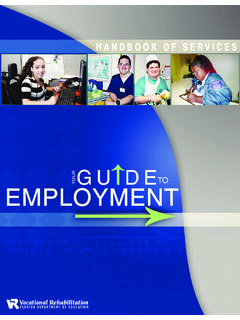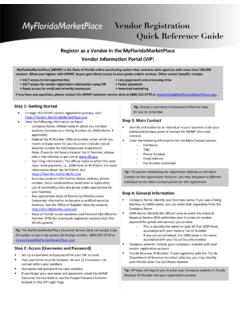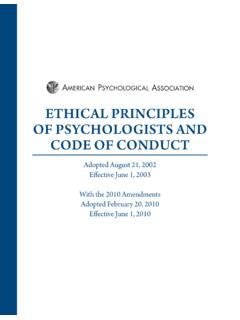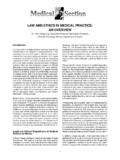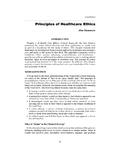Transcription of CODE OF PROFESSIONAL ETHICS FOR ... - rehabworks.org
1 CODE OF PROFESSIONAL ETHICS FOR REHABILITATION COUNSELORS Adopted in September 2016 by the Commission on Rehabilitation Counselor Certification for its Certified Rehabilitation Counselors. This Code is effective as of January 1, 2017. Developed and Administered by the Commission on Rehabilitation Counselor Certification (CRCC ) 1699 East Woodfield Road, Suite 300 Schaumburg, Illinois 60173 (847) 944-1325 TABLE OF CONTENTS PREAMBLE 1 ENFORCEABLE STANDARDS OF ETHICAL PRACTICE 4 Section A: The Counseling Relationship 4 Introduction 4 Welfare of Those Served 4 Respecting Diversity 4 Client Rights 5 Avoiding
2 Value Imposition 6 Roles and Relationships with Clients 6 Multiple Clients 7 Group Work 7 Termination and Referral 7 End-of-Life Care for Terminally Ill Clients 8 Section B: Confidentiality, Privileged Communication.
3 And Privacy 8 Introduction 8 Respecting Client Rights 9 Exceptions 9 Information Shared with Others 10 Groups and Families 10 Responsibility to Clients Lacking Capacity to Consent 10 Records and Documentation 11 Case Consultation 12 Section C: Advocacy and Accessibility 12 Introduction 12 Advocacy 12 Accessibility 13 Section D.
4 PROFESSIONAL Responsibility 13 Introduction 13 PROFESSIONAL Competence 13 Cultural Competence/Diversity 14 Functional Competence 14 PROFESSIONAL Credentials 14 Responsibility to the Public and Other Professionals 15 Scientific Bases for Interventions 15 Section E: Relationships with Other Professionals and Employers 16 Introduction 16 Relationships with Colleagues, Employers, and Employees 16 Organization and Team Relationships 17 Provision of Consultation Services 17 Section F.
5 Forensic Services 18 Introduction 18 Evaluee Rights 18 Forensic Competency and Conduct 18 Forensic Practices 19 Forensic Business Practices 19 Section G: Assessment and Evaluation 20 Introduction 20 Informed Consent 20 Release of Assessment or Evaluation Information 20 Proper Diagnosis of Mental Disorders 20 Competence to Use and Interpret Tests/Instruments 21 Test/Instrument Selection 21 Test/Instrument Administration Conditions 21 Test/Instrument Scoring and Interpretation 22 Test/Instrument Security
6 22 Obsolete Tests/Instruments and Outdated Results 22 Test/Instrument Construction 22 Section H: Supervision, Training, and Teaching 22 Introduction 22 Clincial Supervisor Responsibilities 23 Clinical Supervisor Competence 23 Roles and Relationships Between Clincial Supervisors 24 and Supervisees Supervision Evaluation, Remediation, and Endorsement 24 Rehabilitation Counselor Educator Responsibilities 25 Rehabilitation Counselor Educator Competence 26 Roles and Relationships Between Educators and Students 26 Education Evaluation, Remediation, and Endorsement 27 Section I.
7 Research and Publication 27 Introduction 27 Research Responsibilities 27 Rights of Research Participants 28 Reporting Results 29 Research Publications and Presentations 30 Managing and Maintaining Boundaries 30 Section J: Technology, Social Media, and Distance Counseling 31 Introduction 31 Competence and Legal Considerations 31 Accessibility 31 Confidentiality, Informed Consent, and Security 31 Social Media 32 Section K.
8 Business Practices 32 Introduction 32 Advertising and Soliciting Clients 33 Client Records 33 Fees, Bartering, and Billing 34 Termination and Referral 34 Section L: Resolving Ethical Issues 34 Introduction 34 Knowledge of Ethical Standards and the Law 35 Addressing Suspected Violations 35 Conduct in Addressing Ethical Issues 36 GLOSSARY OF TERMS 37 1 PREAMBLE PURPOSE The Code of PROFESSIONAL ETHICS for Rehabilitation Counselors, henceforth referred to as the Code, is designed to provide guidance for the ethical practice of rehabilitation counselors.
9 The basic objectives of the Code are to: (1) promote public welfare by specifying ethical behavior expected of rehabilitation counselors; (2) establish principles that guide ethical behavior of rehabilitation counselors; (3) serve as an ethical guide designed to assist rehabilitation counselors in constructing a PROFESSIONAL course of action that best serves those utilizing rehabilitation counseling services; and (4) serve as the basis for the processing of alleged Code violations by certified rehabilitation counselors. REHABILITATION COUNSELING SCOPE OF PRACTICE Rehabilitation counseling is a systematic process which assists persons with physical, mental, developmental, cognitive, and emotional disabilities to achieve their personal, career, and independent living goals in the most integrated setting possible through the application of the counseling process.
10 The counseling process involves communication, goal setting, and beneficial growth or change through self-advocacy, psychological, vocational, social, and behavioral interventions. The specific techniques and modalities utilized within this rehabilitation counseling process may include, but are not limited to: assessment and appraisal; diagnosis and treatment planning; career (vocational) counseling; individual and group counseling treatment interventions focused on facilitating adjustments to the medical and psychosocial impact of disability; case management, referral, and service coordination; program evaluation and research; interventions to remove environmental, employment, and attitudinal barriers; consultation services among multiple parties and regulatory systems; job analysis, job development, and placement services, including assistance with employment and job

